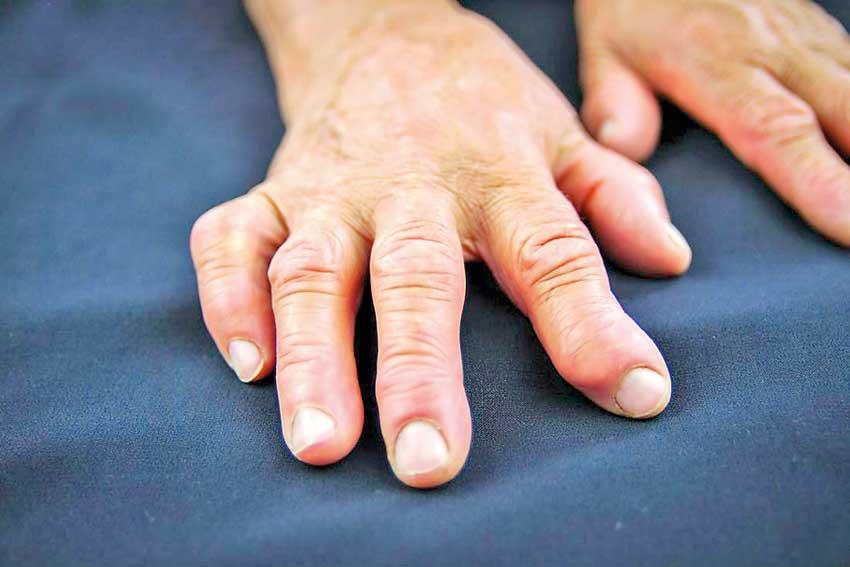18 Mar 2022 - {{hitsCtrl.values.hits}}

 Covid-19 has caused much loss to people over the past 3 years with many deaths and loss of business opportunities being reported. Today’s Health Capsule will focus on how Covid-19 has affected the lives of patients with arthritis. Delving deep into the topic, Consultant in Rheumatology and Rehabilitation at the Matara General Hospital, Dr. Himantha Atukorale explained how Covid-19 has compromised the lives of patients with arthritis.
Covid-19 has caused much loss to people over the past 3 years with many deaths and loss of business opportunities being reported. Today’s Health Capsule will focus on how Covid-19 has affected the lives of patients with arthritis. Delving deep into the topic, Consultant in Rheumatology and Rehabilitation at the Matara General Hospital, Dr. Himantha Atukorale explained how Covid-19 has compromised the lives of patients with arthritis.
Explaining that there are basically two types of arthritis based on the medication patients are on, Dr. Atukorale explained that the first type is “wear and tear” arthritis where the rheumatologists concentrate mainly on bringing down the joint pain and related symptoms.
 “One leading example for this type of arthritis is osteoarthritis mainly affecting the legs. Then there is another type of arthritis called “Inflammatory Arthritis”. We use special medication called immunosuppressants to control inflammatory arthritis. Immunosuppressants can lower a patient’s immunity. As COVID virus is all about one’s immunity, using immunosuppressants should be done with caution. There is also a risk in using strong immunosuppressants. As this might increase the risk of a patient acquiring COVID. Pain killers such as NSAIDs or paracetamol does not impose an extra risk to patients,” explained Dr. Atukorale.
“One leading example for this type of arthritis is osteoarthritis mainly affecting the legs. Then there is another type of arthritis called “Inflammatory Arthritis”. We use special medication called immunosuppressants to control inflammatory arthritis. Immunosuppressants can lower a patient’s immunity. As COVID virus is all about one’s immunity, using immunosuppressants should be done with caution. There is also a risk in using strong immunosuppressants. As this might increase the risk of a patient acquiring COVID. Pain killers such as NSAIDs or paracetamol does not impose an extra risk to patients,” explained Dr. Atukorale.
When inquired on how long does COVID-19 affect an arthritis patient, Dr. Atukorale said that it is debatable. There are a few factors that might decide the duration of COVID infection. The key factor is the variant of the virus. “We definitely have an understanding of how Delta variant caused disease and how OMICRON was a totally different ball game. Then another factor would be the number and types of medication the patient is on at the time of infection. Disease outside arthritis residing within the patient such as diabetes and high-blood pressure also matter. Therefore it is very difficult to determine a duration of disease as multiple factors play key roles,” he explained.
Recommendations to manage arthritis in COVID patients
“We have had a few issues with patients who continued pain killers such as Diclofenac and Celecoxib getting complications after they were found to have dengue instead of COVID. So as a general rule, avoidance of strong pain killers is a must unless a doctor approves the medication. If the patient is on immunosuppressants, certain drugs will be discontinued temporarily or the doses will be adjusted. These changes should be done after consulting a specialist,” Dr. Atukorale cautioned.
Long term side effects
Healthy patients who have had joint pain or swelling after a bout of COVID have been reported. Despite this being rare, it has been observed in some patients, for a few weeks or months. “We have seen arthritis patients who have diseases like rheumatoid arthritis, lupus or spondyloarthritis coming with worsening joint symptoms after acquiring COVID. Sometimes it is difficult to differentiate whether the arthritis symptoms are really because of COVID or is due to abrupt stopping of medication during the infection. Other than joint pain, patients might have muscle ache and undue tiredness on the long run”.
Take home message
“If the arthritis is well managed, and other diseases such as diabetes, high blood pressure are properly controlled, patients need not excessively worry on acquiring COVID-19. The drug doses will be adjusted by the treating physician during the infection. If their joint symptoms worsen after recovering from the virus, I advise them to meet their relevant rheumatology consultants for further medical advice” Dr. Atukorale advised.
20 Dec 2024 5 hours ago
20 Dec 2024 7 hours ago
20 Dec 2024 7 hours ago
20 Dec 2024 9 hours ago
20 Dec 2024 9 hours ago